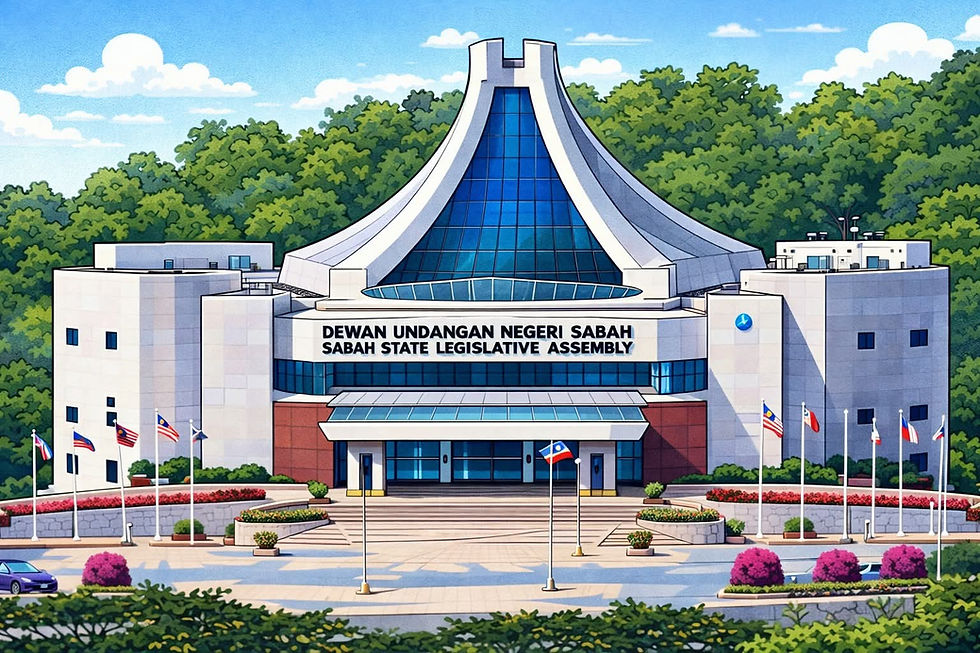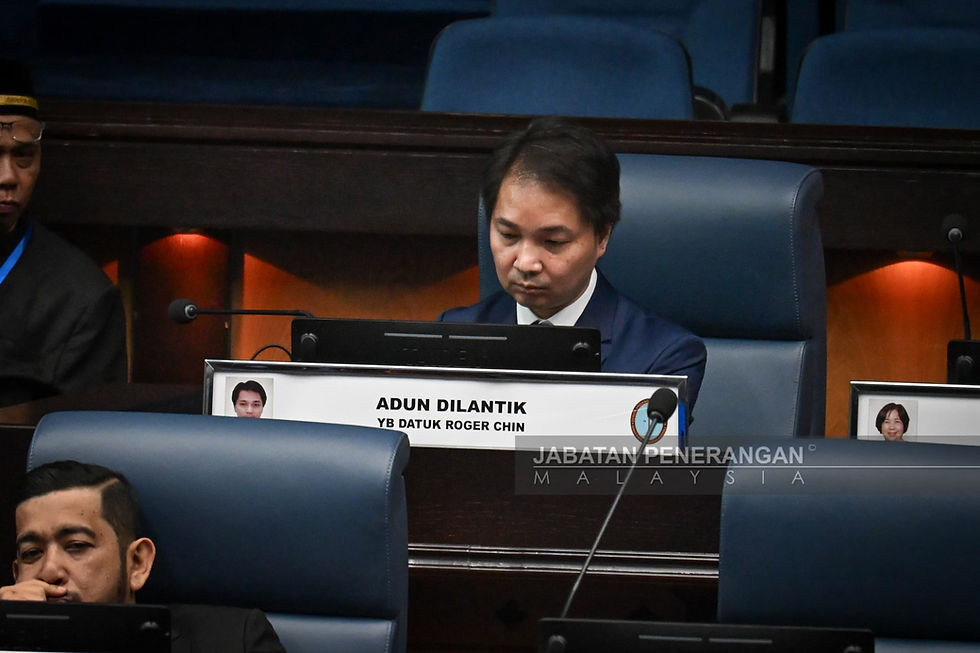Eradicating poverty: Govt should not be too preoccupied with profit
- nabalunews
- Sep 10, 2021
- 6 min read

10 Sept 2021
Dato Mustapa Mohamed (Dato Pa) is not just another Minister; he is like an institution. Since the days of Mahathir Mohamad~Daim Zainuddin and one other; a triumvirate, Dato Pa was the architect of many economic policies for the country. In fact whenever there is a search for a Minister of Economic Affairs; there is no other name that will be put forward. Obviously, he is well-educated and probably has a first-class degree to be so indispensable. The country however needs a first-class mind coupled with a first-class heart, the heart that cares about the poor and the marginalised.
When Dato Pa's late father was unwell, my late father took me along to Bachok to visit him. I remember my father (who was also from Bachok) telling me that he was related to Dato Pa's father in some distant way. I never mentioned to Dato Pa about this possibility; as I do not want him to think I was looking for some projects from him.
Today I want to talk to Dato Pa in the nicest way possible about poverty. I am glad that he has announced that under the 12th Malaysia Plan, the government will address the issues of poverty at all levels. His own family was not exactly middle class in Bachok, so he must have had some experience about what it's like to be poor. It is a subject he understands fully and can even empathise with the conditions of the poor.
The subject of poverty has been part of our government's five-year plans for as long as I can remember. It started in the first five-year Plan in 1971. Poverty eradication was the central platform of government policies for many years. That same policy was again promulgated in the third and other subsequent plans. Of course, if you tell me that we have made good progress compared to the time of Merdeka, I can fully agree.
But this subject of poverty, whether defined as being above subsistence level or to include a level that permits a good healthy and socially satisfying life, should not be in our plan at all. We should be like South Korea, Singapore, and China because we were much more prosperous when we started in 1957 compared to all these countries. We have regressed as our march towards prosperity and high income have floundered. That's very clear. After Covid-19, we will probably have another one million added to the poverty group. So to talk about tackling poverty in an effective way, Dato Pa has to start by asking why did we not become like our neighbour or China, Japan, or South Korea. What factors have pulled us down? Why are we even poorer than Vietnam?
These are the questions Dato Pa needs to ask in all earnestness. Unless we grasp the real problems that inhibit our growth, we can never overcome poverty problems but will exacerbate them. Irrespective of the impressive five-year plan.
I am not an economist nor do I understand much about economic planning; but I know from what I see and observe the factors that have materially contributed to our inability to overcome poverty and maintain sustainable growth that can generate prosperity for the people of this country to share.
The real treason is that our leaders are preoccupied with becoming rich. The government wants to be rich, instead of taking the people out of poverty. So the government dabbles in all kinds of business. They privatised government business, but at great costs to the people. They sold assets of the military, of GLCs and of MARA but the juice of the privatised entity was soon swallowed by the lucky owners but not the government.
When I was young I used to go all over Kelantan using buses owned by MARA. Today, there is no longer bus services for the poor to move around. Public transport is non existent. Some individuals become filthy rich when they took over government assets and sold them off. This is not the way to help the people.
The government used to own a National savings entity, Bank Pertanian and other cooperatives. Then some bright sparks suggested we corporatized them; so the government could reduce losses and improve on non-performing loans. They wanted to be more efficient. Efficiency it seemed was more urgently needed, rather than helping the needy; it was much easier for the rakyat to get loans in those days. They want to follow the great BAFIA model. they said the government officers were not business-like and could not do much to help the cooperatives and the government entities make money.
So when these government entities were corporatised, they started hiring "clever' executives from commercial banks and private sectors. Profit becomes the main focus. So is the bonus to be paid to these executives. Naturally, these government entities prefer to lend to big corporations, so they can reduce their non-performing loans. Which makes bank Negara happy. They can be assured of higher profit. so it makes sense if Agrobank would lend Ringgit 500 million at good rates to conglomerates like IOI instead of Ringgit 500,000 to an old farmer because they don't have to be exposed to any risk.
Equally, Bank Rakyat would be more inclined to lend to big companies than helping the poor farmers cooperatives or traders because the big companies have all the paperwork sorted out; and hence risk assessment is easier. Just follow Bank Negara guidelines.
Dato Pa has to answer a very basic question. What is the government’s role? Should not help the people be a priority? It is no good the mantra Dr Mahathir always used; that it is ok to give projects or give loans to the rich or big corporations because they paid taxes. In the first place, I don't know how much the rich pay taxes. Clever people are not always honest. What must not be forgotten is the role of the government to give a helping hand to the Rakyat. That's their prime responsibility.
A good and responsible government wants to make society more equal, and opportunities more accessible... Life is hard for most people in the country. The government should not be too preoccupied with profit. It should be concerned how to implement policies to give jobs, provide an adequate safety net and improve the income of the rakyat.
Other rich countries limit the kind of business government dabbles in; to those strategic and high technology businesses. They also privatised difficult and sophisticated projects; but they always do that if it will help the people, as opposed to intermediaries, by doing so.
Our government wants to make quick money. They want to build a two billion Ringgit airport in Kulim; when that money can be better used to help the poor in Yan and other outline districts to overcome floods and pay for other infrastructure inadequacies. They spent 3.5 billion on Bestari Net, but what is the success story in our schools' internet connectivity that we can be proud of? Now another 15 billion will go towards 5G, but I am sure Dato Pa will be hard-pressed to explain how those megaprojects will alleviate poverty. Don’t tell me about the trickle-down effect, please.
The government dabbles in all sorts of business, airport business, service business, textile, retail industry and 500 other types of business. But unfortunately, the benefits and money does not always go down to the people. I don’t know if the money even gets to the government. How come the government has no money to employ doctors on a permanent basis if they have received so much money from the privatised and corporatized entities? I suspect intermediaries become rich but not the government nor the people. There is a big layer of intermediaries who are a threat to the poverty alleviation programmes.
I want to suggest to Dato Pa, do not trust private and corporatized government entities and GLcs to understand the difficulties of the Rakyat. Government must revert to using and employ government servants who are still happy to serve the people. If we have to remove some of the civil servants who are not capable of doing their work, please remove them. It is better to have 800,000 highly skilled and motivated civil servants than 1.6 million who can't perform and have no heart to serve.
Dato Pa should know that in all the rich and prosperous countries, there is one common denominator. They have the best and the brightest to serve the government. Unless we have a transformed civil service, we will not be able to alleviate poverty and bring prosperity to the people.
I know it is a daunting task to change the structural weakness in government; but what good is extravagant and nice-sounding policies that have failed to work in the last 50 years? We can't find short term solutions to cure deep-seated and chronic problems of the past. For too long we play politics with people's lives. This must end.
We can't replace deadwood and inefficient civil servants to run government machinery and business with private sector recruitment alone; smart guys understand corporate principles and figures but do not understand the rakyat's needs. We need a motivated and inspired civil service to lead the march towards poverty alleviation. Dato Pa needs to believe that there are fully committed and clever people who are happy to serve the government, and the country if they are given meaningful roles and an adequate salary.
Politicians are short term players and although we have to tolerate and live with them, the long term solution to effective policy implementation lies with the civil service. Making poverty alleviation a reality and providing for a prosperous and more equitable country is a reformed civil service. That's what we see in developed countries. Why should it be different here?
DATUK ZAID IBRAHIM
Former Minister in the Prime Minister's Department for Legal Affairs and Judicial Reform
Former Dewan Rakyat Senator


















Comments